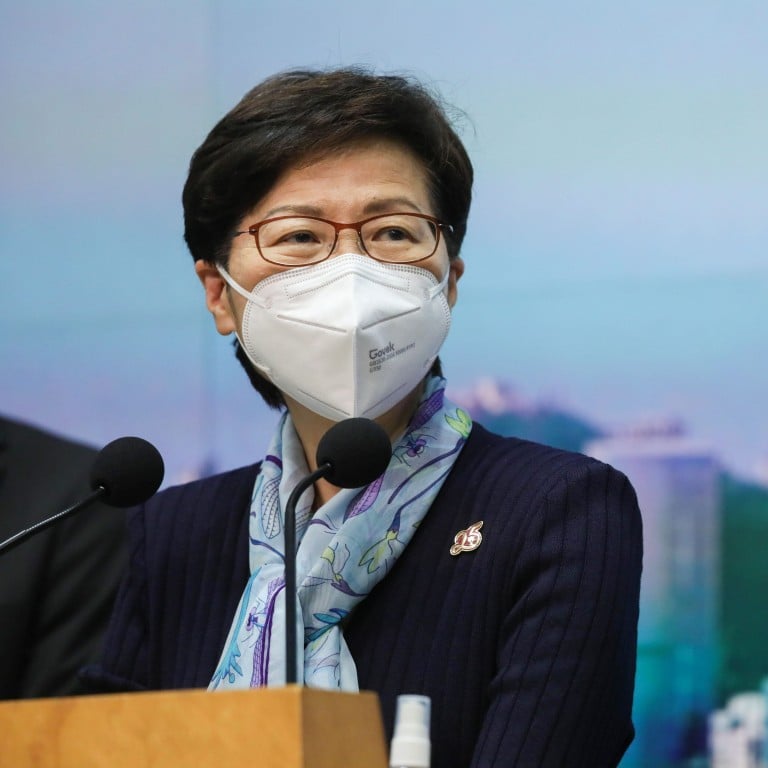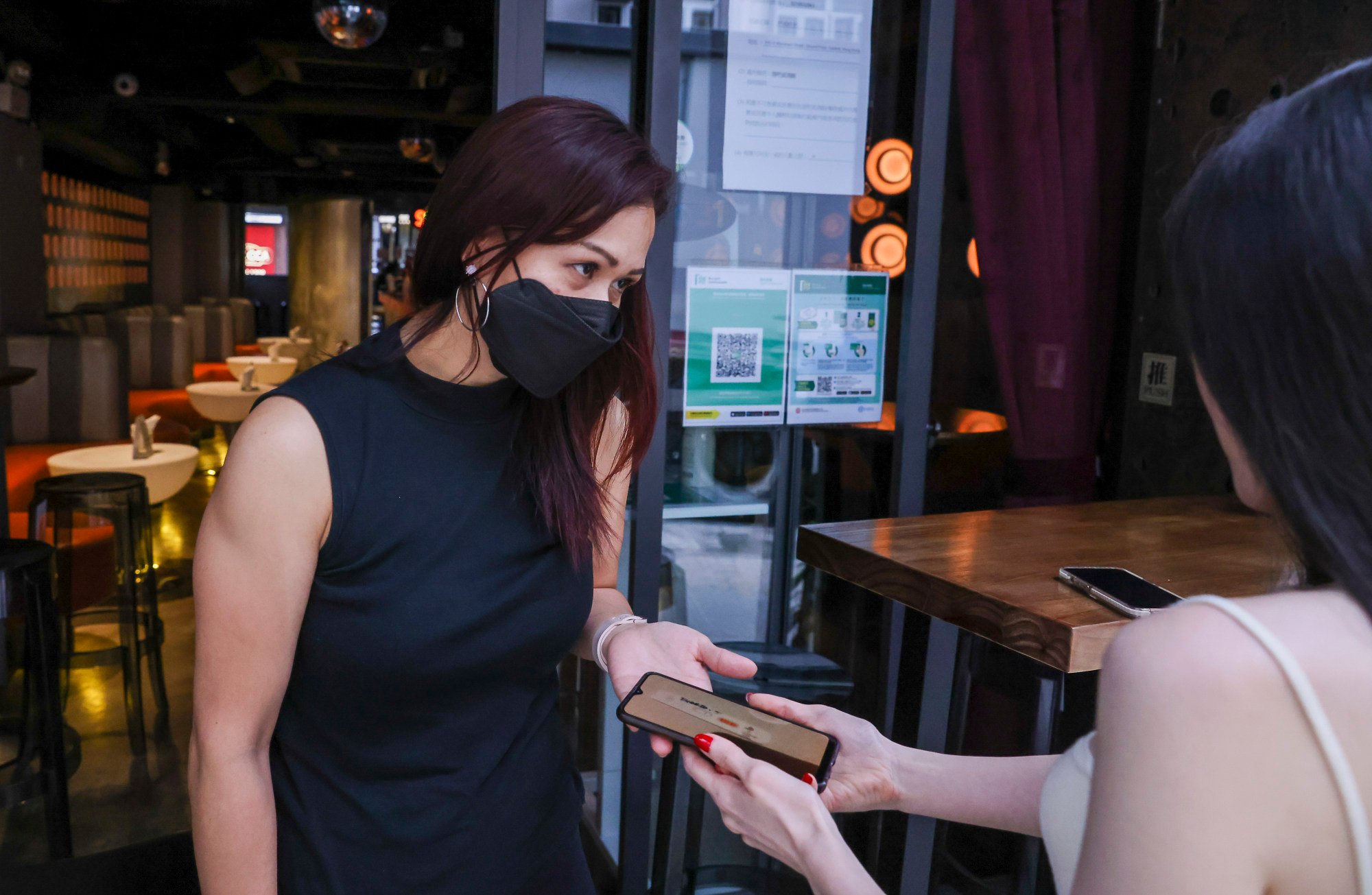
Coronavirus: surge in cases prompts Hong Kong to bolster testing; infections top 1,000 for 3 days straight
- Health authorities report 1,014 local infections and 131 imported ones, along with one more death
- Joint scientific committee also advises extending interval between first and second BioNTech vaccine jab from three weeks to eight for people aged 18 to 59
-
Daily rapid antigen testing requirement for students and school staff will be kept in place until the end of the school year
-
Care home staff will be required to receive the third vaccine dose and undergo a polymerase chain reaction (PCR) test every two weeks
-
Reverse quarantine plan for care homes with outbreaks
-
Kai Tak Cruise Terminal isolation facility could be reopened at any time
-
Handover anniversary celebration events to continue, while participants will receive free testing kits
-
Testing kits will be distributed to more groups, including property management companies, and construction sites
Authorities have strengthened Covid-19 testing measures and revived plans to tackle possible large outbreaks at care homes in Hong Kong, as the number of infections exceeded 1,000 for a third straight day.
Cases have been discovered in 11 care homes over the past seven days, with both staff members and residents infected, health officials revealed on Friday, stoking fears of the virus spreading among some of the city’s most vulnerable residents much as it did at the peak of the fifth wave in March. While Chief Executive Carrie Lam Cheng Yuet-ngor set out several measures aimed at combating the rising number of infections, no specific strategy for boosting the vaccination rate among the elderly was mentioned.
“The direction of our work is to reduce any possible emergence of large outbreaks,” Lam said. “We are targeting key premises and groups of people, as well as raising epidemic awareness and anti-epidemic abilities.”
Health authorities on Friday confirmed 1,014 local infections and 131 imported ones, along with one additional death linked to the virus. While the daily number of cases has nearly doubled since last week, the city has so far managed to avoid an explosion of infections, according to Dr Albert Au Ka-wing, principal medical and health officer at the Centre for Health Protection.
“In the past two weeks, there has been a gradual increase in the number of cases. We can confirm that there are a large number of chains of transmission in the community and a certain degree of transmission,” Au said. “We expected the caseload to be at this level after social-distancing rules were eased … We hope to avoid an explosive increase in cases, which we have not seen as of now.”
The centre’s joint scientific committee also advised extending the interval between the first and second dose of the German-made BioNTech vaccine from three weeks to eight for people aged 18 to 59. The recommendation was based on additional evidence indicating that a longer delay would result in a better immune response and lower risk of myocarditis, an inflammation of the heart muscle.
Among the measures announced by Lam, students and school staff must continue taking rapid antigen tests (RAT) daily to enter campus until the end of the academic year in mid-August. Lam also urged schools to reduce meal gatherings that would involve students or staff taking off their masks. A total of 126 schools reported infections, involving 102 students and 43 staff.
It will be Father’s Day in two days. I hope cross-family gatherings can be reduced
Staff at care homes must undergo polymerase chain reaction (PCR) tests every two weeks, on top of the current daily RAT requirement. They must be triple-vaccinated, instead of the current two-jab criteria. But Lam did not put forward any idea for increasing the inoculation rate for the elderly; just 42.9 per cent of residents aged 70 or above have taken three shots.
The distribution of free RAT kits to the elderly, which was due to end this month, would continue until “the epidemic comes under more control”, Lam said.
The kits would also be given to more groups, including property management companies, construction site workers, and at events marking the 25th anniversary of the handover.
The government would also resume reverse quarantining at care homes hit by large outbreaks, moving residents neither infected nor deemed a close contact of a Covid-19 case into isolation, she said. The community isolation facility at Kai Tak Cruise Terminal, which was used at the peak of the fifth wave and put on standby when infections declined, could also start taking in patients, she said. But she gave no timelines for introducing the two measures.
Lam also urged the public to reduce all unnecessary banquets and activities that involved the removal of masks.
“It will be Father’s Day in two days. I hope cross-family gatherings can be reduced,” she said. “If there are any such gatherings … they must be extra careful.”
The leader, whose term ends on June 30, noted she had cancelled farewell gatherings with department heads on Friday, a get-together with ministers next week and another one with lawmakers on Tuesday.
Hong Kong bar patrons adopt laid-back attitude to new rapid testing rule
But she stressed the situation had not yet reached a level that warranted banning cross-family gatherings, a measure that was adopted during the peak of the fifth wave and dropped in late April.
Lam said the public health system had not yet been overwhelmed, as less than half of 422 Covid-19 patients in hospital had a high viral load requiring isolation beds, and only three of 22 patients in severe condition admitted to intensive care units.
The government announced separately that some civil service employees must undergo rapid testing regularly or on a needs basis. The affected staff included those crucial for maintaining the operation of bureaus or departments during emergency and those required to be in contact with the public as part of their jobs.
The number of government employees required to take daily rapid tests would increase from about 78,000 in mid-April to over 106,000, roughly 60 per cent of the civil service.
Government pandemic adviser Professor David Hui Shu-cheong agreed that extending the daily rapid test requirement among students and school staff until the end of the academic year would help prevent the spread of the coronavirus. He also stressed that the vaccination rate among the elderly needed to be raised, and while mobile vaccination teams could continue to carry out their work at care homes and facilities, there was no way to make inoculation among older residents mandatory.
Elsewhere in the city, 20 cases were discovered in a police department, where officers were not required to interact daily with the public, health authorities said. A source told the Post the infected officers belonged to the counterterrorism response unit, but insisted they accounted for only a small number of its total.
He said the officers were placed in quarantine and operations would not be affected.
New Covid-19 curbs leave Hong Kong businesses, residents counting the cost
Hong Kong is just two weeks away from the 25th anniversary of its July 1 return to Chinese rule, with celebratory events planned and state leaders expected to visit.
As of June 9, the reproductive number for Covid-19, compiled by the University of Hong Kong, had increased to 2.0523, meaning an infected person can pass the pathogen to more than two others.
Earlier on Friday morning, an official said Hong Kong authorities had cracked down on patrons and operators of pubs and nightclubs over a new rule requiring proof of a negative result from a Covid-19 rapid test.
“If you are going to do a rapid test, you need to take off your mask. Is it appropriate to do it on the street or on the premises? If you are found positive on the spot, you are affecting a lot of people and there is a risk of spreading the virus,” Irene Young Bick-kwan, director of the Food and Environmental Hygiene Department, warned a day after the new measure came into force.
She urged businesses not to allow customers to get screened on the spot.
The simplest way was for patrons to conduct such tests in private, such as at home, before coming down to the venue, Young told a radio programme.

A check by the Post on Thursday night found some customers had simply ignored the RAT requirement but were allowed entry into bar zones – also subject to the new rule – at some restaurants. Other news reports found operators offering rapid test kits on the spot.
Young said authorities had begun taking enforcement action on Thursday night, and she was still gathering figures on cases of prosecution or malpractices.
Under the stepped-up measure for the nightlife sector, pub-goers have to show a photo of a negative RAT result taken within 24 hours.
Customers will have to write their names and the date and time of the test on the kit before taking a photo of the result with their phone. The image must be presented to venue staff for entry.
“Law enforcement officers are experienced in judging the authenticity of information provided by patrons, and they can also ask an individual to show identification for verification,” Young said.
She added that operators who had performed due diligence should not be worried about breaches.

Several Covid-19 clusters have been connected to bars and clubs since late May, with at least six premises reporting about 350 infections.
Wilson Lam, vice-president of the Hong Kong Society for Infectious Disease, said on the same radio show that apart from pubs, authorities should also be on guard for potential outbreaks from kindergartens as the vaccination rate among younger children was low, and some were too young for the jabs.
Children as young as three in Hong Kong can receive the Chinese-made Sinovac shot, but some kindergartens offer pre-nursery classes for those under two years old.
“The best way is to maintain the requirement for students to conduct daily RAT so positive cases do not end up in schools,” Lam said.
The city’s Covid-19 tally stood at 1,224,132 cases, with 9,393 related deaths.
Additional reporting by William Yiu


